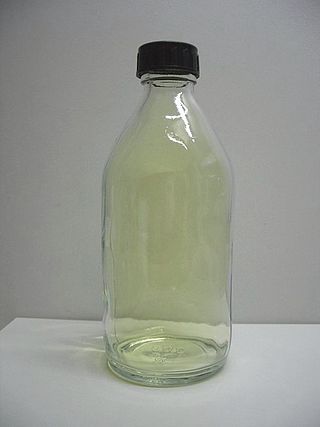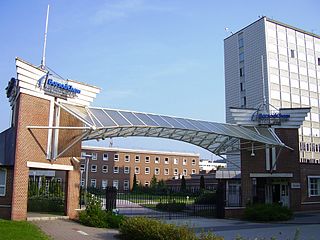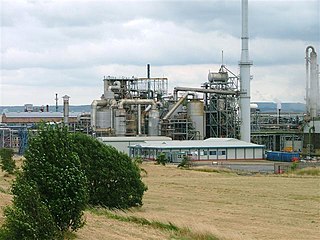
Chlorine is a chemical element; it has symbol Cl and atomic number 17. The second-lightest of the halogens, it appears between fluorine and bromine in the periodic table and its properties are mostly intermediate between them. Chlorine is a yellow-green gas at room temperature. It is an extremely reactive element and a strong oxidising agent: among the elements, it has the highest electron affinity and the third-highest electronegativity on the revised Pauling scale, behind only oxygen and fluorine.

In chemistry and manufacturing, electrolysis is a technique that uses direct electric current (DC) to drive an otherwise non-spontaneous chemical reaction. Electrolysis is commercially important as a stage in the separation of elements from naturally occurring sources such as ores using an electrolytic cell. The voltage that is needed for electrolysis to occur is called the decomposition potential. The word "lysis" means to separate or break, so in terms, electrolysis would mean "breakdown via electricity".

The chemical industry comprises the companies and other organizations that develop and produce industrial, specialty and other chemicals. Central to the modern world economy, it converts raw materials into commodity chemicals for industrial and consumer products. It includes industries for petrochemicals such as polymers for plastics and synthetic fibers; inorganic chemicals such as acids and alkalis; agricultural chemicals such as fertilizers, pesticides and herbicides; and other categories such as industrial gases, speciality chemicals and pharmaceuticals.

Litvínov is a town in Most District in the Ústí nad Labem Region of the Czech Republic. It has about 23,000 inhabitants. It is known as an industrial centre.
The chloralkali process is an industrial process for the electrolysis of sodium chloride (NaCl) solutions. It is the technology used to produce chlorine and sodium hydroxide, which are commodity chemicals required by industry. Thirty five million tons of chlorine were prepared by this process in 1987. The chlorine and sodium hydroxide produced in this process are widely used in the chemical industry.

Orlen S.A., commonly known as Orlen, is a Polish multinational oil refiner and petrol retailer headquartered in Płock, Poland. The company's subsidiaries include the main oil and gas companies of the Czech Republic and Lithuania, Unipetrol and Orlen Lietuva respectively.

Neratovice is a town in Mělník District in the Central Bohemian Region of the Czech Republic. It has about 16,000 inhabitants. It is an industrial town.

Kralupy nad Vltavou is a town in Mělník District in the Central Bohemian Region of the Czech Republic. It has about 19,000 inhabitants. It is known as a traffic hub and industrial agglomeration.

Industrial gases are the gaseous materials that are manufactured for use in industry. The principal gases provided are nitrogen, oxygen, carbon dioxide, argon, hydrogen, helium and acetylene, although many other gases and mixtures are also available in gas cylinders. The industry producing these gases is also known as industrial gas, which is seen as also encompassing the supply of equipment and technology to produce and use the gases. Their production is a part of the wider chemical Industry.
Ammonia production takes place worldwide, mostly in large-scale manufacturing plants that produce 183 million metric tonnes of ammonia (2021) annually. Leading producers are China (31.9%), Russia (8.7%), India (7.5%), and the United States (7.1%). 80% or more of ammonia is used as fertilizer. Ammonia is also used for the production of plastics, fibres, explosives, nitric acid, and intermediates for dyes and pharmaceuticals. The industry contributes 1% to 2% of global CO
2. Between 18-20 Mt of the gas is transported globally each year.
Hydrogen production is the family of industrial methods for generating hydrogen gas. There are four main sources for the commercial production of hydrogen: natural gas, oil, coal, and electrolysis of water; which account for 48%, 30%, 18% and 4% of the world's hydrogen production respectively. Fossil fuels are the dominant source of industrial hydrogen. As of 2020, the majority of hydrogen (~95%) is produced by steam reforming of natural gas and other light hydrocarbons, partial oxidation of heavier hydrocarbons, and coal gasification. Other methods of hydrogen production include biomass gasification and methane pyrolysis. Methane pyrolysis and water electrolysis can use any source of electricity including renewable energy.

Orlen Unipetrol is a Czech joint stock company owned by a Polish oil company PKN Orlen. The company is engaged in crude oil processing and the production, distribution, and sales of fuels and petrochemical products – mainly plastics and fertilisers – in the Czech Republic and the Central European region. It is the only crude oil processing company in the Czech Republic, and its earnings rank it among the ten largest Czech companies. It was founded in 1994, and in 2004, it became part of the PKN Orlen group, which owns 100% shares in the company. The following companies have been gradually incorporated into Unipetrol: Kaučuk, Chemopetrol, Benzina, Paramo, Koramo(merged with Paramoin 2003), Česká rafinérská, Unipetrol Trade, Spolana, and Unipetrol Rafinérie. The Unipetrol group includes refineries and production plants in Litvínov and Kralupy nad Vltavou, Paramo in Pardubice and Kolín with its Mogul brand and Spolana in Neratovice, and two research centres in Litvínov and Brno. The network of Benzina fuel stations – the largest network in the Czech Republic with its 406 stations – is also part of Unipetrol.

Sable Chemical Industries Limited is the sole manufacturer of ammonium nitrate (NH4NO3) in Zimbabwe.
Chlorine gas can be produced by extracting from natural materials, including the electrolysis of a sodium chloride solution (brine) and other ways.

Wanhua-BorsodChem is a Hungarian chemical raw material manufacturing company headquartered in Kazincbarcika, Northern Hungary. It is the European member of the Wanhua Chemical Group. The company specializes in isocyanates, PVC and chlor-alkali (vinyl) businesses. The main production site is located in Kazincbarcika, Hungary but the production is also supported by other European production capacities located in Ostrava, the Czech Republic and Kędzierzyn-Koźle, Poland. Several branch offices are available in Hungary, Belgium, the Czech Republic, Croatia, Italy and Poland. Since 2008 a new R&D and technical support center was established in Gödöllő.

The Billingham Manufacturing Plant is a large chemical works based in the Borough of Stockton-on-Tees, England. In agricultural terms, it is one of the most important factories in Britain.
Chemical industry in Poland - one of the key branches of the processing industry which includes:
The chemical companies of the large-scale chemical synthesis in Poland at the beginning of the 21st century, underwent the a process of intensive reorganization.
The Bonnington Chemical Works was a pioneer coal tar processing plant established in Edinburgh. It was probably the first successful independent facility established for the integrated treatment of gasworks waste, and manufactured the residues of the Edinburgh gasworks into useful products for over half a century.

St Rollox Chemical Works was a industrial manufacturer of chemicals located in Glasgow, Scotland, that began in the Georgian era in 1799 and operated continuously until 1964. It was owned and operated by Scottish industrialist Charles Tennant and was described as the largest plant in Europe, if not the world.














